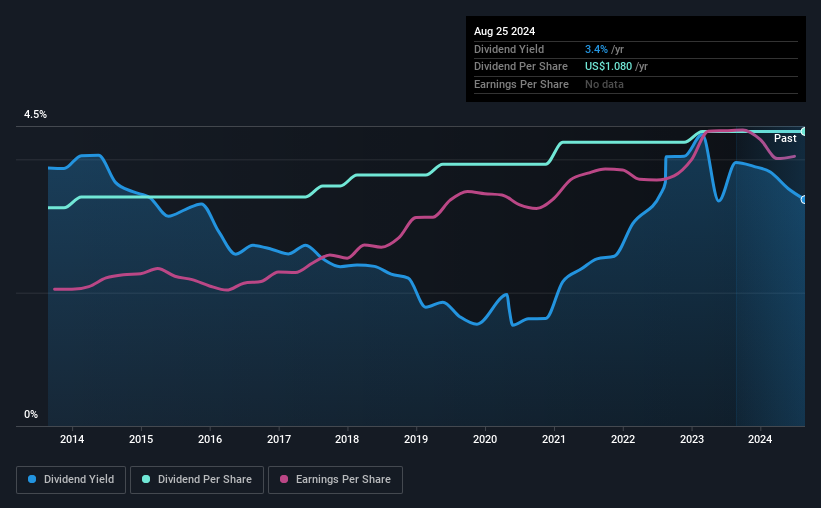- United States
- /
- Banks
- /
- NasdaqCM:FCAP
First Capital (NASDAQ:FCAP) Will Pay A Larger Dividend Than Last Year At $0.29
The board of First Capital, Inc. (NASDAQ:FCAP) has announced that it will be increasing its dividend by 7.4% on the 27th of September to $0.29, up from last year's comparable payment of $0.27. The payment will take the dividend yield to 3.4%, which is in line with the average for the industry.
See our latest analysis for First Capital
First Capital's Earnings Will Easily Cover The Distributions
Solid dividend yields are great, but they only really help us if the payment is sustainable.
First Capital has established itself as a dividend paying company with over 10 years history of distributing earnings to shareholders. Taking data from its last earnings report, calculating for the company's payout ratio shows 30%, which means that First Capital would be able to pay its last dividend without pressure on the balance sheet.
If the trend of the last few years continues, EPS will grow by 3.6% over the next 12 months. Assuming the dividend continues along recent trends, we think the future payout ratio could be 31% by next year, which is in a pretty sustainable range.

First Capital Has A Solid Track Record
The company has a sustained record of paying dividends with very little fluctuation. The annual payment during the last 10 years was $0.80 in 2014, and the most recent fiscal year payment was $1.08. This implies that the company grew its distributions at a yearly rate of about 3.0% over that duration. Slow and steady dividend growth might not sound that exciting, but dividends have been stable for ten years, which we think makes this a fairly attractive offer.
Dividend Growth May Be Hard To Achieve
Investors could be attracted to the stock based on the quality of its payment history. Earnings has been rising at 3.6% per annum over the last five years, which admittedly is a bit slow. Earnings growth is slow, but on the plus side, the dividend payout ratio is low and dividends could grow faster than earnings, if the company decides to increase its payout ratio.
We Really Like First Capital's Dividend
In summary, it is always positive to see the dividend being increased, and we are particularly pleased with its overall sustainability. Distributions are quite easily covered by earnings, which are also being converted to cash flows. All in all, this checks a lot of the boxes we look for when choosing an income stock.
Market movements attest to how highly valued a consistent dividend policy is compared to one which is more unpredictable. Meanwhile, despite the importance of dividend payments, they are not the only factors our readers should know when assessing a company. You can also discover whether shareholders are aligned with insider interests by checking our visualisation of insider shareholdings and trades in First Capital stock. Looking for more high-yielding dividend ideas? Try our collection of strong dividend payers.
New: AI Stock Screener & Alerts
Our new AI Stock Screener scans the market every day to uncover opportunities.
• Dividend Powerhouses (3%+ Yield)
• Undervalued Small Caps with Insider Buying
• High growth Tech and AI Companies
Or build your own from over 50 metrics.
Have feedback on this article? Concerned about the content? Get in touch with us directly. Alternatively, email editorial-team (at) simplywallst.com.
This article by Simply Wall St is general in nature. We provide commentary based on historical data and analyst forecasts only using an unbiased methodology and our articles are not intended to be financial advice. It does not constitute a recommendation to buy or sell any stock, and does not take account of your objectives, or your financial situation. We aim to bring you long-term focused analysis driven by fundamental data. Note that our analysis may not factor in the latest price-sensitive company announcements or qualitative material. Simply Wall St has no position in any stocks mentioned.
About NasdaqCM:FCAP
First Capital
Operates as the bank holding company for First Harrison Bank that provides various banking services to individuals and business customers in Indiana and Kentucky, the United States.
Flawless balance sheet with solid track record and pays a dividend.
Similar Companies
Market Insights
Community Narratives



